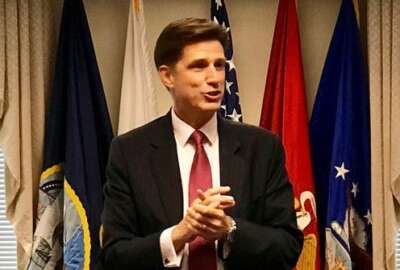
One year in, where does the Federal Data Strategy go from here?
Nearly a year after the governmentwide Chief Data Officers Council held its first meeting, members are looking to move agencies beyond “quick wins” and one-...
Best listening experience is on Chrome, Firefox or Safari. Subscribe to Federal Drive’s daily audio interviews on Apple Podcasts or PodcastOne.
Nearly a year after the governmentwide Chief Data Officers Council held its first meeting, members of the council are looking to move agencies beyond “quick wins” and one-off solutions to build stronger data literacy from the top-down.
Agencies, of course, have spent considerable effort getting a handle of their troves of data before the Foundations for Evidence-Based Policymaking Act required agencies to name a CDO and the Federal Data Strategy gave them a roadmap of what to do. But CDOs say recent visibility around their mission has helped them make connections with employees who are already data-savvy.
Jim Rolfes, the CDO and chief information officer at the Consumer Product Safety Commission, said the proliferation of agency chief data officers has strengthened and given greater visibility to an informal community of federal employees with data science skills.
“There has been a federal data community that’s been ad hoc, loosely connected for well over a decade … but we haven’t had the kind of regularity and the kind of formality of those conversations that I think will be really important in getting traction for the whole federal enterprise,” Rolfes said last week at American Council for Technology-Industry Advisory Council’s virtual ReImagine Nation ELC conference.
Jamal El-Hindi, the interim CDO at the Treasury Department, said his office has given employees a sense of where they can go to get the most value from their work. The key for CDOs to build trust, he said, is to come up with “quick wins” for agency employees through the data.
“You tread a little bit lightly, but fact is these groups have been looking for greater guidance and greater alignment. The establishment of a centralized CDO office provides them with a place to go with respect to questions. There are a lot of projects, and there are a lot of initiatives that might wither on the vine, simply because it might be a good idea but nobody knows how to bring it forward on a bigger basis within the organization,” El-Hindi said.
Daniel Morgan, the CDO at the Transportation Department, said the agency already has a cadre of employees who are excited about getting the most of the data, but his office helps empower them to connect with the other people and data they need to succeed in their work.
“At least in my agency, what I have is a bunch of folks who are really dedicated to managing high-quality data sets, and they’re just never satisfied with how good they are. And if you can harness that kind of energy and transform the disappointment into a positive direction, and equip them with the tools and the policies and the practices that will help them succeed, that’s the way to find the quick win – to get the data set that they never had before, to connect the data that they weren’t able to previously connect,” Morgan said.
The Trump administration, because of the COVID-19 pandemic, pushed back some of this year’s deadlines for the Federal Data Strategy’s 2020 action plan, but Kshemendra Paul, the CDO at the Veterans Affairs Department, said the pandemic has also accelerated the demand for data dashboards. Agencies have relied on these dashboards to track COVID-19 infections in areas and reopen facilities.
While agencies have spent much of the past year overhauling their own data infrastructure, Paul said one of the major themes in the Federal Data Strategy’s 2021 action plan should be interagency partnerships and collaborations with other CDOs.
The VA, for example, is in talks with the Defense Department to develop a joint data and analytics strategy, based around some of the VA’s customer experience work and journey-mapping of how veterans interact with the services that it offers.
“We’re looking to push those back into the service member’s journey. An obvious idea, but one that’s pretty profound and leads to a lot of implications for interoperability, data sharing, joint analytics, joint development and things like that,” Paul said.
Despite some forward momentum, CDOs still have a lot of work to do with few resources. Paul recalled that in a survey of CDOs at large agencies, the top concern was mission management – a combination of the workforce and investments in technology and shared services.
Kirsten Dalboe, the CDO at the Federal Energy Regulatory Commission, said small agencies like hers are looking for opportunities to adopt some of the best practices that larger agencies have pioneered, including a strategy to recruit and retain a workforce with in-demand data science skills.
“We’re always competing with industry, so how can we make our work compelling enough to bring people into the work that we’re doing?” Dalboe said.
CDOs, meanwhile, share these mission management responsibilities with more entrenched C-suite executives, including chief information officers, chief financial officers and chief technology officers. Rolfes, who’s dual-hatted as the CIO and CDO at CPSC, said both of his titles overlap in significant ways.
“There was an opportunity for a certain amount of synergy, a certain amount of reuse of those efforts and to focus that direction. It’s also true that we’re a small agency and so we’re tight on resources, and it’s not unusual in smaller agencies that you have more collateral kinds of duties,” Rolfes said.
Looking ahead, CDOs are looking at sharing best practices and developing buy-in from agency leaders to encourage agency-wide participation in the data transformation they’re trying to achieve. Rolfes said one indicator of that buy-in would be the federal workforce developing data science skills, and not just relegating those skills to select analysts in back offices.
“In the future, it’s much more standard, almost every job has some aspect of data management or data analytics to it,” he said.
Building a coalition of agency officials committed to data transformation, and getting buy-in from agency executives, Morgan said, is essential to meeting the goals of the Evidence Act and the Federal Data Strategy, but will take the longest-term goal CDOs will have to accomplish.
“Sure, you can solve someone’s problem, and that’s how you can create value and create an appetite for what that future looks like, but you also need people bought-in for a very long haul,” Morgan said.
Copyright © 2024 Federal News Network. All rights reserved. This website is not intended for users located within the European Economic Area.
Jory Heckman is a reporter at Federal News Network covering U.S. Postal Service, IRS, big data and technology issues.
Follow @jheckmanWFED





